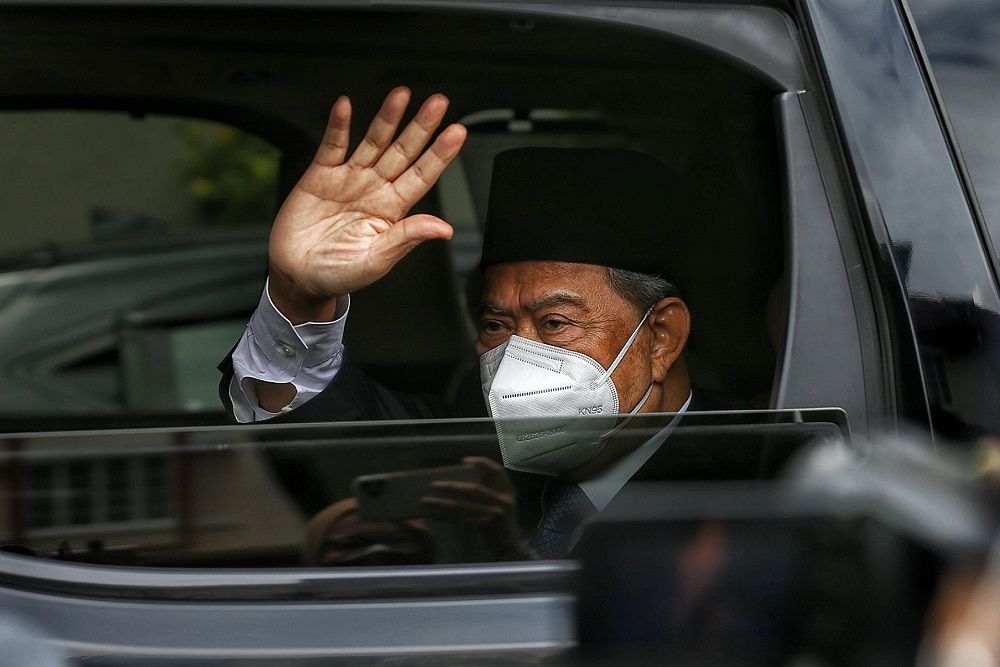KUALA LUMPUR, Dec 26 — Amidst the backdrop of a raging pandemic, the nation in the year 2021 went through a series of momentous and decisive political events that, among others, witnessed the premiership changing hands and two state elections held.
Picking up from an unsettling 2020, the country’s turbulent political landscape showed no signs of abating as Malaysians were fed with one drama after another, including calls for the resignation of eighth prime minister Tan Sri Muhyiddin Yassin.
As the government grappled with record numbers of Covid-19 cases and fatalities as well as economic uncertainties, Muhyiddin and his ministerial cabinet, on Aug 16, resigned.
The Perikatan Nasional (PN) chairman and Pagoh MP had been sworn in as Prime Minister on March 1, 2020 following the sudden resignation of Tun Dr Mahathir Mohamad a week earlier.
Muhyiddin quit after his leadership no longer commanded majority support in Parliament.
Four days later, Umno vice-president Datuk Seri Ismail Sabri Yaakob, who was deputy prime minister during Muhyiddin’s administration, was sworn in as the nation’s ninth prime minister after securing the support of 114 MPs who had affirmed their decision to the Yang di-Pertuan Agong Al-Sultan Abdullah Ri’ayatuddin Al-Mustafa Billah Shah to enable him to form the next government.
To ensure the smooth running of his new administration without political aggravation and interference, Ismail Sabri on Sept 13 signed the Memorandum of Understanding (MoU) on Transformation and Political Stability between the Federal Government and Pakatan Harapan to forge bipartisan cooperation on the back of the Keluarga Malaysia (Malaysian Family) concept as its foundation.
The historic memorandum has six agendas, covering the strengthening of the Covid-19 plan, administrative transformation, Parliamentary reform, independence of the judiciary, the Malaysia Agreement 1963 (MA63) and the formation of a steering committee.
The MoU also stated that the government had agreed not to dissolve Parliament before July 31, 2022, with the cooperation also in line with the King’s decree for all parties to work together to resolve issues plaguing the country.
The signing of the MoU somewhat cooled the political temperature with all parties now shifting their focus on recovery efforts as a result of the Covid-19 pandemic.
This ‘political respite’ was a short-lived one, though. As the nation battled hard against the pandemic that resulted in many states eventually moving into Phase Four of the National Recovery Plan (PPN) and the lifting of the inter-state travel ban, a political storm was brewing in Melaka.
The Barisan Nasional (BN)-led Melaka government eventually fell on Oct 4 after four assemblymen — Datuk Seri Idris Haron (BN-Sungai Udang), Datuk Nor Azman Hassan (BN-Pantai Kundor), Datuk Norhizam Hassan Baktee (Independent-Pengkalan Batu) and Datuk Noor Effandi Ahmad (Bersatu-Telok Mas) — withdrew their support for Chief Minister Datuk Seri Sulaiman Md Ali’s leadership.
This paved the way for a state election to be held.
The Election Commission (EC) on Oct 18 fixed Nov 20 as polling day which saw 112 candidates contesting 28 seats up for grabs.
Mindful of the ongoing Covid-19 pandemic, the election was conducted with strict standard operating procedures, including a ban on house-to-house campaigns and ceramahs, among others, and as political parties were encouraged to take their campaigns online to minimise the risk of Covid-19 transmission, many predicted that the polls would be a tight affair with no party capable of securing enough support to form the new government on their own.
This proved to be a fallacy as BN, opting to contest without their Muafakat Nasional (MN) partner PAS, won the election in style, sweeping 21 seats for a two-thirds majority victory, while PH won five seats and PN two.

‘Election fever’ was back less than a month later, this time in Sarawak after the Yang di-Pertuan Agong consented to the Proclamation of Emergency for the state, which took effect on Aug 2, to be lifted.
This indirectly paved the way for the 12th Sarawak state election to be held as the term of the State Legislative Assembly had ended on June 6. Polling was set for Dec 18 and nominations on Dec 6.
The election saw a record 349 candidates from the state-based ruling coalition Gabungan Parti Sarawak (GPS), nine opposition parties and independents contesting.
GPS, contesting in an election on its own for the first time, eventually coasted to a landslide win, capturing 76 out of the 82 seats up for grabs.
Parti Sarawak Bersatu (PSB) became the new opposition force in the state by taking four seats while DAP took a hit and could only manage two seats this time around.
Besides this, two political parties, PAS and MIC, also held party elections this year after they had to be postponed last year due to the Covid-19 pandemic. — Bernama



















